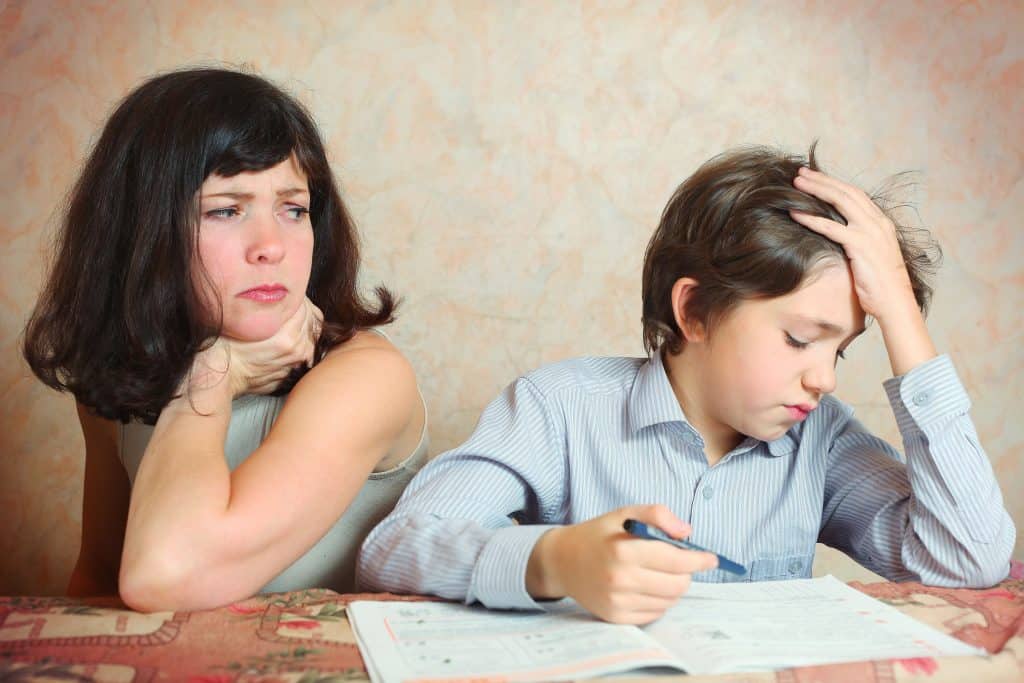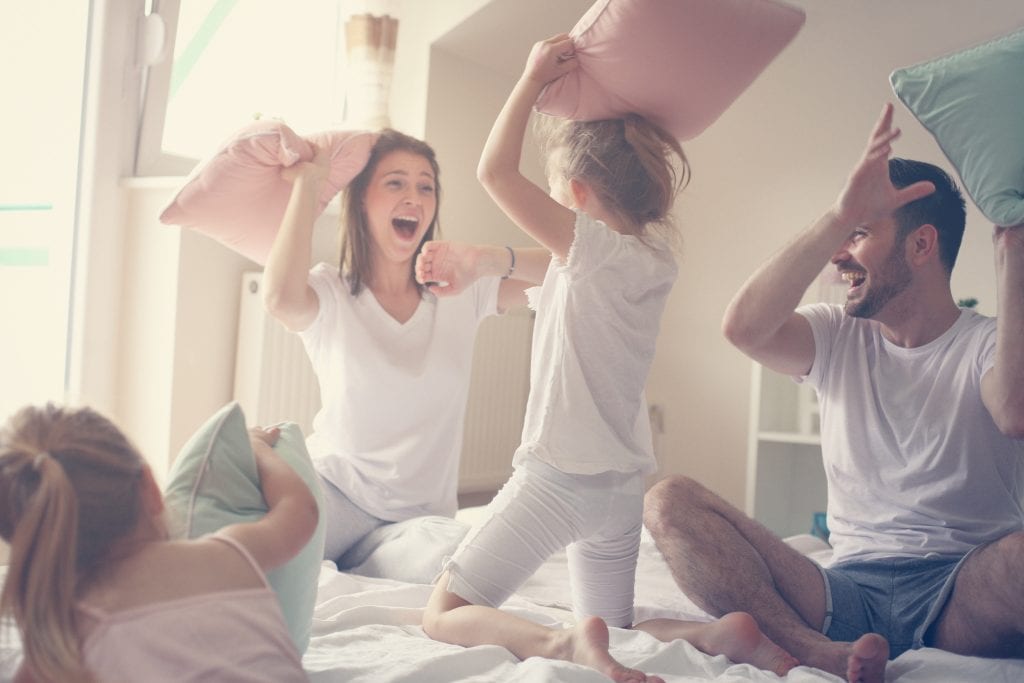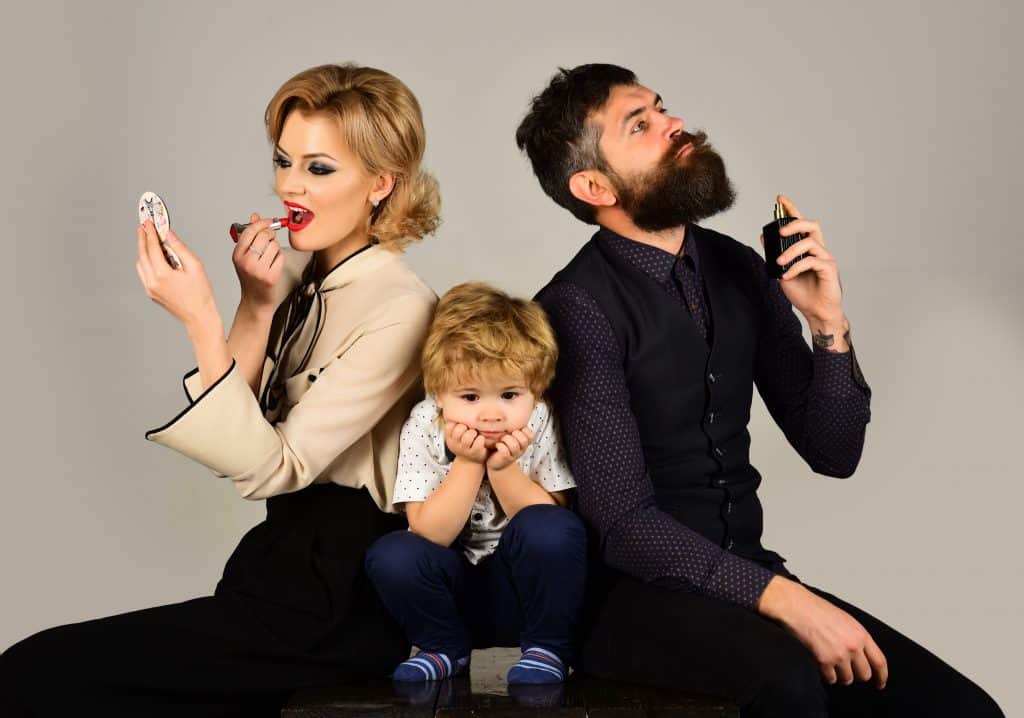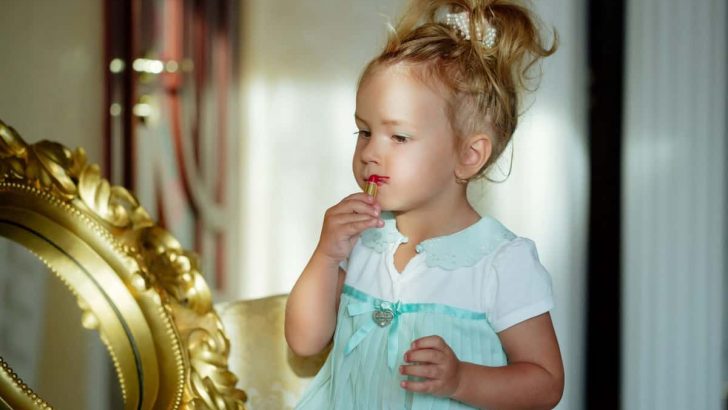When your little girl asks you if she can wear make-up, what do you say?
I was particularly interested in this question because I have an eight-year-old daughter.
You may think your daughter is too young to wear make-up.
Then again, maybe you don’t want to ban make-up altogether.
After all, she could always wear make-up behind your back.
So, what should you do as a parent?
If you’re a mom, you probably remember your first encounters with your own mother’s makeup.
Many of us have sneaked a peek and rummaged through our mother’s cosmetic bags and tried on lipsticks, lip glosses and mascaras.
Even if our mom forbade it, these are some of the most beautiful moments we remember from our childhood.
In fact, I still remember the first time I put on one of her dresses, stilettos and make-up.
She looked at me as if I were a clown.
At the same time, I probably looked like one with her oversized clothes and dripping make-up.
Nowadays, you see a lot of make-up in stores and drugstores, especially dedicated to little girls.
Recently, Zara also launched its new – you guessed it – children’s make-up.
The collection includes face pastels, colorful make-up brushes, children’s nail polishes…
Some will say there’s nothing wrong with it, while others will take the position that children shouldn’t wear make-up.
For many girls, make-up is a fun way to express themselves.
However, seeing well-dressed girls their own age in magazines or on social networks can encourage them to want to wear make-up sooner than mothers would like.
So, what’s the best response to have as parents?

I put the question to the psychologist at the school of my life, Madame Poirier.
Here’s what she said.
Instead of a simple answer about if and when kids should buy make-up…
Instead of whether you should allow make-up…
I can only offer another perspective.
The point is not so much what we give children, but how and why we do it.
If beautification is forced on a child, it doesn’t really make them happy.
Indeed, in this case, the parents are embellishing for themselves and for photos on social networks.
In this case, the answer is “no”: make-up should not be allowed on young children.
I don’t think any parent wants to impose on a child the idea that he’s not good enough or beautiful enough as he is, that physical appearance and grooming are the ultimate values, that he has to pretend to like something to please his parents.
Nevertheless, it happens that the child’s behavior, which may not have such bad intentions, sends exactly this message.
Which can have no positive effect on his self-image, the world or his relationship with his parents.
Just look at American kindergarten beauty contests!
However, it’s important to remember that the way you do it is important.

On the other hand, you shouldn’t exaggerate your indignation at children’s make-up.
Most girls, and some boys, have been taking their mother’s make-up, clothes, nail polish, etc. for generations and trying them on.
This has nothing to do with beautification, but with identification with their parents, which is particularly emphasized at certain stages of development and is actually healthy.
Children learn how to behave in a new and unfamiliar world, mainly by imitating us.
And in their children’s eyes, parents are the main role models.
Children identify primarily with the parent of the same sex, but this need not always be the case.
So children whose mothers wear make-up will probably one day try it on themselves, just as children whose parents cook will want a playful kitchen.
Children whose parents drive will want a small car…
And so on!
Even if it’s not the parents, if the child sees that it’s an adult figure or a character from stories/cartoons in which they see themselves doing something, they’ll try that too.
This shouldn’t be discouraged, in fact, as long as it’s safe for the child.
On the whole, it’s important that children’s main objective in trying make-up is play.

In this case, Zara’s campaign is a huge success!
So, if your daughter wants make-up, there’s nothing wrong with her trying it on.
But in a playful, fun way, so that she can draw and enjoy tactilely and visually, without rules on how to apply eyeshadow or lipstick.
The aim shouldn’t be to look prettier!
Children’s make-up is probably safer for children’s delicate skin, but also for mom’s more expensive items 🙂
On the other hand, it’s better for the child to have something of their own.
This will save a lot of stress for mom, who won’t have to warn her every two minutes telling her not to damage anything.
When a child is putting on make-up, it’s best to emphasize the effort, the pleasure, the color, etc., in the comments.
It’s absolutely essential to avoid saying something like: “Wow, you’re so beautiful now, like a real girl!
A child can wear make-up with Mom.
In fact, mom and daughter can play together, then remove the make-up from the face with gentle, soothing touches.
I’d like to clarify one point:

If a boy wants to get involved in make-up research or, as the kids see it, ‘painting like mommy’, don’t shame him or tell him it’s only for girls.
It’s research, the forbidden fruit is always sweeter, and for most boys, the interest will quickly pass on its own.
Instead of classic make-up, you can also try “face paint” (made from approved ingredients), which the whole family can enjoy – kids, mom and dad!
Make-up experienced in this way can’t be a problem, but an opportunity for socialization, positive identification, play, fun, exchange and tenderness.

Mother of three and a primary school teacher. I’ve always loved being around children and helping them, so I chose my path as a teacher. It is sometimes hectic with three children, but I am 100 percent into it and wouldn’t change it for anything in the world.

